Testing Infotainment Systems: Best Practices Your Automotive Development Team Should Know

The modern automobile industry is fast-paced and highly competitive, and infotainment systems have become an essential feature in cars. These systems offer drivers a wide range of features, including navigation, music, and hands-free calling, which makes the driving experience more convenient and enjoyable. However, with the increasing complexity of these systems, ensuring their reliability and functionality has become a major challenge for automotive development teams. 
Automated testing has emerged as an essential tool for ensuring the quality of infotainment systems. This process uses specialised software to automatically execute tests on a system, reducing the need for manual intervention. Automated testing includes functional testing, which verifies that the system behaves as expected, and performance testing, which measures the system's response time and resource usage. By automating these tests, development teams can quickly and easily identify potential issues early on in the development process, reducing the need for costly and time-consuming
manual testing.
One of the key benefits of automated testing is that it can be carried out by non-technical team members, such as QA professionals and designers, using codeless test creation tools. These tools, such as those offered by companies like Nextgen, allow for the creation of test scripts without the need for coding skills. This makes the QA testing process more accessible to a wider range of team members, allowing for more thorough and efficient testing.
Codeless test creation also has a number of other advantages for automotive development teams. Firstly, it can help reduce the complexity and cost of test automation, making it more accessible for small and medium-sized development teams. Secondly, codeless test creation allows for greater flexibility and scalability in the testing process, enabling teams to quickly and easily adapt to changes in the infotainment system. This is especially important in the context of rapidly evolving technologies such as in car infotainment.
While automated testing is a valuable tool, it should not be the only approach used. The best practice is to use a combination of automated and manual testing to achieve optimal results. Manual testing can be used to test the usability and user experience of the infotainment system, which may not be easily measurable through automated tests.
In conclusion, implementing automated testing, especially using codeless test creation tools, can greatly benefit automotive development teams by increasing the efficiency, reliability, and accessibility of the testing process. By
staying updated with the latest testing tools and best practices, automotive development teams can ensure that their infotainment systems meet the high standards of quality and functionality expected by today's consumers.
Nextgen provides codeless automation platforms designed for the specific needs of automotive infotainment developers, offering a solution that leverages the latest automated testing practices to benefit automotive development teams. To find out more about how Nextgen can help with complex automotive testing by using our automated test solutions, please get in touch.



